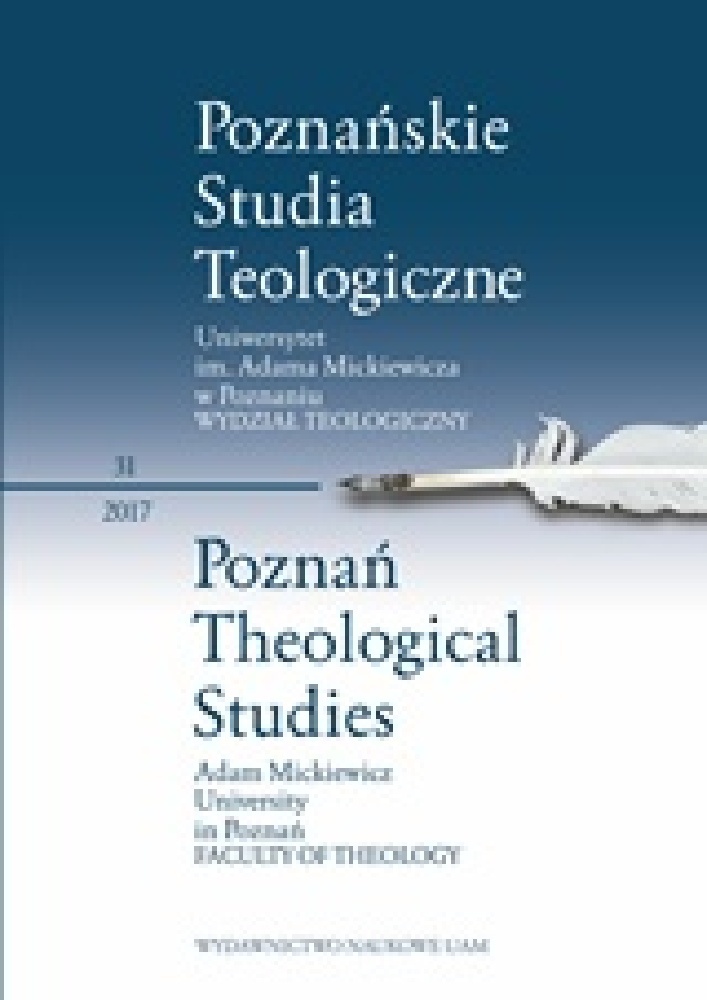Abstract
The discovery of universal freedom is an achievement of Saint Paul, and an achievement of the Church is a consequent propagation of this fact throughout the centuries. The Christian character of this discovery was already noticed by Hegel. In today’s world, so strongly marked by the search of freedom it is necessary to reiterate the Christian vision of freedom which is a universal one. This vision is profoundly theological in character and deeply rooted in the mystery of redemption brought by Jesus Christ. This article touches upon this fact and points out its certain aspects, especially the soteriological one. Bearing in mind the theology of freedom we cannot ignore its abundant anthropological references. The article recalls the proposition of St. Thomas Aquinas, which has been largely accepted by Catholic theology and constitutes a benchmark of anthropological philosophy which has a special application in ethics. Christian tradition stresses the fact that for a human, freedom is above all “a vocation”. Therefore, on the one hand God’s definite design through Jesus Christ concerning man has to find its eschatological realization, on the other hand man’s freedom which is solidifying in this design has to revel and show itself to the full. Undoubtedly, the eschatological issue in Christian vision of freedom is worth mentioning as well.
Riferimenti bibliografici
Angelis B. de, Natura, persona, libertà. L’antropologia di Massimo il Confessore, Roma 2002.
Bierdiajew M., Głoszę wolność. Wybór pism, tłum. H. Paprocki, Warszawa 1999.
Delikostantís D., L’ethos della libertà, Sotto il Monte 1997.
Fabro C., Riflessioni sulla libertà, Rimini 1983.
Gaïth J., La conception de la liberté chez Grégoire de Nysse, Paris 1953;
Hegel G. W. F., Encyklopedia nauk filozoficznych, tłum. Ś.F. Nowicki, Warszawa 1990.
Królikowski J., Nowe wady główne (cz. II: Konsumizm), „Homo Dei” 84(2015) nr 2, s. 64-74.
Królikowski J., Nieskończone miłosierdzie czy wieczne piekło?, w: Oblicza miłosierdzia,
red. M. Terka, J. Kapuściński, Ł. Laskowski (Veritati et Caritati, t. 5), Częstochowa 2015, s. 85-99.
Lubac H. de, Dramat humanizmu ateistycznego, tłum. A. Ziernicki, Kraków 2004.
Metz J. B., Freiheit als philosopisch-theologisches Grenzproblem, w: Gott in Welt. Festgabe für Karl Rahner, hrsg. J. B. Metz, W. Kern, A. Darlapp, H. Vorgrimler, Bd. 1, Freiburg–Basel–Wien 1964, s. 287-314.
Przywara E., Augustinisch. Ur-Haltung des Geistes, Einsiedeln 1970.
Rahner K., H. Vorgrimler, Mały słownik teologiczny, tłum. T. Mieszkowski, P. Pachciarek, Warszawa 1987.
Schlier H., La fine del tempo, Brescia 1974.
Schooyans M., La dérive totalitaire du libéralisme, Paris 1995.
Tomasz z Akwinu, De veritate.
Tomasz z Akwinu, Sententia Ethicorum.
Tomasz z Akwinu, Summa theologiae.
Tomasz z Akwinu, De unitate Verbi incarnati.
Trapè A., S. Agostino: Introduzione alla Dottrina della Grazia, t. 2: Grazia e libertà, Roma 1990.
Valsecchi A., Il fine dell’uomo nella teologia di Tommaso d’Aquino. Un percorso attraverso le opere maggiori, Roma 2011.
Yannaras Ch., La libertà dell’ethos. Alle radici della crisi morale in occidente, Bologna 1984.
Licenza
Copyright
© 2017 Uniwersytet im. Adama Mickiewicza w Poznaniu, Wydawnictwo Naukowe UAM, Poznań
OPEN ACCESS
